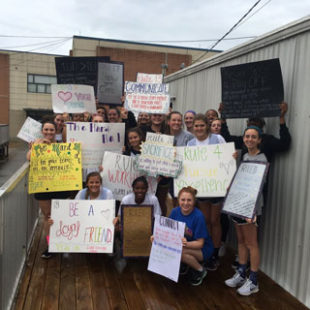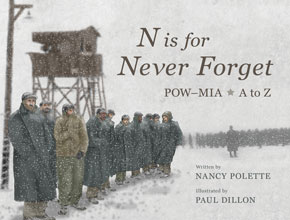A group of college women occupy chairs in the team room. Sitting in a circle, each athlete has a copy of Coach Wooden’s Pyramid of Success in her lap. Some of the books are highlighted and dog-eared and one of the women jokes that her book is overdue at her hometown library. It is September in Minnesota, and a Division III women’s college hockey team has gathered to begin their team-building conversation. Coach-mandated and team-voted, John Wooden’s book will be used as a touchstone throughout their season.
At biweekly meetings, the women will discuss and debate the merits of the various building blocks of the pyramid outlined in the book. They will agree upon the definitions that apply specifically to their team and they will vote each week for players who best exemplify the success blocks upon which they are working to build.
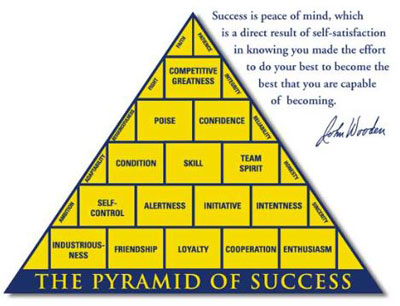 Which player demonstrated loyalty this week? Which player has the highest level of confidence? The deep, ongoing conversations that stem from these questions are due to the book these players read together in the preseason.
Which player demonstrated loyalty this week? Which player has the highest level of confidence? The deep, ongoing conversations that stem from these questions are due to the book these players read together in the preseason.
More and more, books are among the tools coaches employ to build their athletes and teams. With a central, and often thematic focus, members of a sports team can learn a lot about themselves and each other when they open books together.
Kate Leavell, Head Women’s Lacrosse Coach at Division II Adams State College in Alamosa, Colorado, and author of Confessions of an Imperfect Coach: An Experiment in Team Culture That Changed Everything, has coached teams of varying ages for most of her life. She became a proponent of books as a team-building tool while she was in her twenties. Since then, she has used books with at least eight of the teams she has coached.
“Books offer a better opportunity for conversation. Piece by piece, people fill in the blanks themselves,” Leavell says. “Players and coaches can learn a lot about each other in that process.”
An advocate for a number of Jon Gordon’s bestselling books, Coach Leavell has incorporated different books depending on the needs of the group with whom she works.
Leavell contends Gordon’s The Energy Bus: 10 Rules to Fuel Your Life, Work, and Team with Positive Energy is good for teams with toxic culture. With one team, for which Leavell assisted a brand new head coach, the tide of toxicity was turned because of their work with that book. They read The Energy Bus as a group the first week of the season. There were complaints and hesitations for the first two days and the team was on the brink of losing too many players to compete. By the fourth day, and because of conversations that were happening among the team members, 80 percent of the group was engaged and talking about it. By the end of the week, the entire group had read it and three of the players, who had initially seemed the most toxic, were actually leading the discussion. As a final accountability, the players were asked to sign a bus ticket: an agreement to be on the same bus, with the mission they had discussed. All players turned in their signed ticket and several of the players explained they thought the experience was life-changing.
“It’s less about the book and more about the catalyst that brings them together,” Leavell explains. “It takes several sessions for them to start to open up and books provide the space and time to do that.”
For teams with entitlement issues, gaps in talent and/or playing time, or teams that struggle with cliques, The Hard Hat: 21 Ways to Be a Great Teammate is Gordon’s book Leavell recommends. With The Hard Hat, she pairs people up who are assigned a rule in the book and they make a poster defining the rule in a way applicable to the team. The rules are then hung in the locker room for the season.
“Having a book can be extremely good in culture building,” Leavell says.
She explains it’s easy, once the season starts, for coaches to be drawn into mistakes and obsess about how they will fix them. It’s hard to say, “Let’s sit around and team build” in the middle of a season.
“Books help coaches get redirected back on mission,” Leavell says. “If you read a book [with your team], you are guaranteed to be putting time into your team culture. Books help to re-center.”
Books can provide a focal point, that if built into the fabric of a group of people with common goals, will help keep the group on track.
Jim Thompson, founder and CEO of the national organization Positive Coaching Alliance (PCA), also encourages laying the groundwork, then incorporating frequent and focused conversations around books to improve athlete performance as well as overall youth sports culture.
PCA workshops and books put coaches, parents, and athletes on the same page. Thompson’s five most popular books: Positive Sports Parenting, The High School Sports Parent, Elevating Your Game: Becoming a Triple-Impact Competitor, The Power of Double-Goal Coaching: Developing Winners in Sports and Life, and Developing Better Athletes, Better People: A Leader’s Guide to Transforming High School and Youth Sports into a Development Zone work collectively and as stand-alone books to further enhance positive engagement and development for all people involved in youth and high school sports. With over 700,000 books distributed to youth sports leaders, coaches, parents and athletes, the PCA conversation is loud and growing.
“I encourage coaches to get copies to give to their players or they can work with one copy of the book. We encourage conversations rather than meetings,” says Thompson. “When kids get done with school they want to run. They want to be active. We encourage shorter, more-often conversations.”
The model the high school and youth coaches are encouraged to use includes two to four conversations per practice that are no more than two to three minutes.
“Maybe after a conditioning drill,” Thompson suggests. “They do some running and then in their recovery they have a team conversation. One player can read from Elevating Your Game, for example, and they can talk about mistake ritual and how the next play is the most important play.”
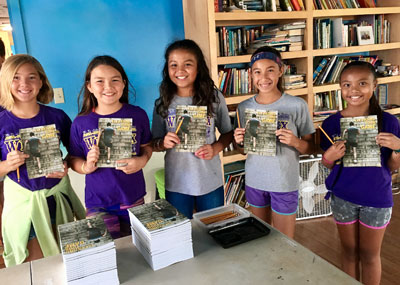
Athletes attending a PCA workshop in Hawaii read Elevating Your Game by Jim Thompson to learn and talk about achieving peak performance, developing leadership skills, and competing with class.
Open-ended questions like “‘What’s the value of what we just read for our team?’ can generate lots of conversation, especially after a robust conditioning drill.”
A valuable exercise for parents and their athletes is also available in the positive parenting book. Parents are instructed to fill out the 100-point valuation exercise, prioritizing why they are involved in sports as a family. They are encouraged to fill it out separately from and prior to discussing it with their child. After the parents have completed it, the next step is to have the athletes complete their own 100-point valuation exercise. Once each person has filled it out, parents and kids exchange their lists and discuss the similarities and differences.
“It leads to incredible conversation, sometimes between spouses and then with their athlete too,” Thompson says. “The 100-point exercise is great to get everyone on the same page.”
Professional hockey player Ben Holmstrom agrees that books are a great focal point for people who want to engage in sports and head in the same direction. Holmstrom, who has played professionally in the AHL and NHL for eight years, read books with his college teammates when he was a player at UMass-Lowell and the conversations were a way to get the group focused.
Each summer, the UMass-Lowell coaches assigned a book for the players to read. The expectation was that they would read the books, submit a paper pulling out the themes, and then one of the first meetings of the season would include a focused discussion about the major themes identified in the book.
Over Holmstrom’s time in college, he and his teammates read Lone Survivor by Marcus Luttrell and Patrick Robinson, Mind Gym by Gary Mack, The Winner Within by Pat Riley, and No Excuses by Kyle Maynard.
“For each book, we pulled out themes and talked about what we wanted our mentality to be for the season,” Holmstrom explains. “It was to get everybody thinking on the same page.”
Holmstrom admits the more relatable the book, the more impactful it was for him and for the team. “The Winner Within was easy to relate to and I got a lot out of that one. Actually, the guys who are still playing [professionally] were more into it [reading books] and invested more in the process.” Holmstrom explains that the guys who knew they were going to take their sports career to the next level were most interested in the learning opportunities provided by the additional reading.
With hopes to be a coach one day, Holmstrom plans to read books for his own development and with his teams. “If I end up coaching at the college level, I would definitely use them. For pro players, I would for sure use them on an individual basis for those who need some development on the mental side of the game.”
There is great value in the way books deepen learning and encourage continued education. Whether it is an assignment for a team of college players, a short conversation on a high school field, professional development for a coach or professional athlete, or a launching pad for family goal-setting, books are helping to positively influence the growing conversation around competition and sports performance. Fields, courts, and rinks may not seem like a likely place for book discussion, but an enhanced experience is possible when those connected as part of a team also read a book together.
Author and coach Kate Leavell
Web: KateLeavell.com
Twitter: @KateLeavell
Positive Coaching Alliance
Web: PositiveCoach.org
Facebook: /PositiveCoachUS
Twitter: @PositiveCoachUS
Jim Thompson
Twitter: @JimThompson18
Ben Holmstrom
Twitter: @BenHolmstrom
Ben’s teams:
Bridgeport Sound Tigers Twitter: @TheSoundTigers
NY Islanders Twitter: @NYIslanders
Coach/Team Suggested Reading List
Looking for good books for team discussions or coach professional development? Coaches and players on Twitter offer the following list of book suggestions.
Above the Line: Lessons in Leadership and Life from a Championship Program by Urban Meyer, with Wayne Coffey
Beyond Grit: Ten Powerful Practices to Gain the High-Performance Edge by Cindra Kamphoff
Chop Wood Carry Water: How to Fall in Love with the Process of Becoming Great by Joshua Medcalf
Coach Wooden’s Pyramid of Success by John Wooden, with Jay Carty
The Cubs Way: The Zen of Building the Best Team in Baseball and Breaking the Curse by Tom Verducci
Destination Unstoppable by Maureen Monte
Developing Better Athletes, Better People: A Leader’s Guide to Transforming High School and Youth Sports into a Development Zone by Jim Thompson
Elevating Your Game: Becoming a Triple-Impact Competitor by Jim Thompson
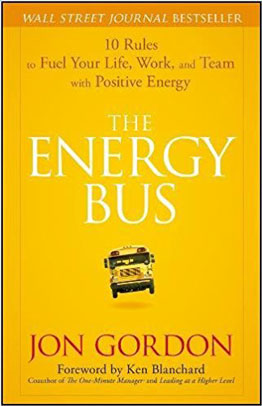 The Energy Bus: 10 Rules to Fuel Your Life, Work, and Team With Positive Energy by Jon Gordon
The Energy Bus: 10 Rules to Fuel Your Life, Work, and Team With Positive Energy by Jon Gordon
The Hard Hat: 21 Ways to Be a Great Teammate by Jon Gordon
The High School Sports Parent by Jim Thompson
Leading: Learning From Life and My Years at Manchester United by Alex Ferguson, with Michael Moritz
Leave No Doubt: A Credo for Chasing Your Dreams by Mike Babcock, with Rick Larsen
Legacy: What the All Blacks [New Zealand Rugby team] Can Teach Us About the Business of Life by James Kerr
Mindset: The New Psychology of Success by Carol S. Dweck, PhD
Next Generation Leader: 5 Essentials for Those Who Will Shape the Future by Andy Stanley
Positive Sports Parenting: How Second-Goal Parents Raise Winners in Life Through Sports by Jim Thompson
The Power of a Positive Team: Proven Principles and Practices That Make Great Teams Great by Jon Gordon
The Power of Double-Goal Coaching: Developing Winners in Sports and Life by Jim Thompson
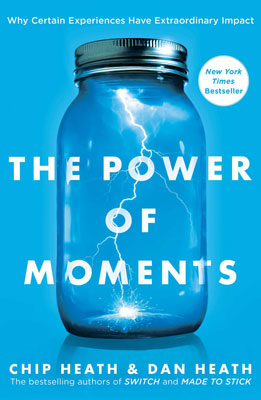 The Power of Moments: Why Certain Experiences Have Extraordinary Impact by Chip Heath and Dan Heath
The Power of Moments: Why Certain Experiences Have Extraordinary Impact by Chip Heath and Dan Heath
The Talent Code: Greatness Isn’t Born. It’s Grown. Here’s How. by Daniel Coyle
Teammates Matter: Fighting for Something Greater Than Self by Alan Williams
That First Season: How Vince Lombardi Took the Worst Team in the NFL and Set It on the Path to Glory by John Eisenberg
Training Camp: What the Best Do Better Than Everyone Else by Jon Gordon
Way of the Warrior Kid: From Wimpy to Warrior the Navy SEAL Way (a novel) by Jocko Willink, illustrated by Jon Bozak
What Drives Winning by Brett Ledbetter
You Win in the Locker Room First: The 7 C’s to Build a Winning Team in Business, Sports, and Life by Jon Gordon
Meagan Frank is in her third year as the head coach for a men’s high school soccer team. She has been coaching teams for over twenty years, since her graduation from Colorado College where she played Division I soccer and Division III basketball. A national speaker, Meagan presents to parents, athletes, and coaches about best practices, positive psychology, and the latest research involving youth sports issues. She is currently seeking representation for her nonfiction book Choosing to Grow: Youth Sports Choices that Actually Matter. Meagan’s current writing, including her Sportsvine blog, can be found on her website MeaganFrank.com.
This article was first published August 2018.


